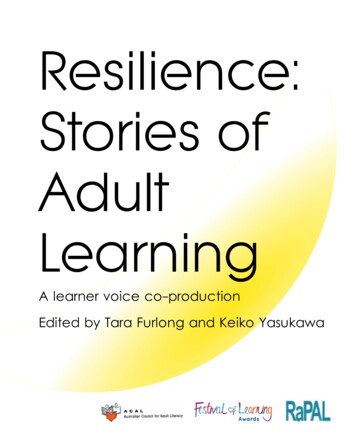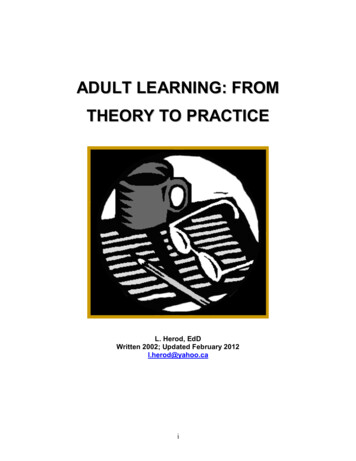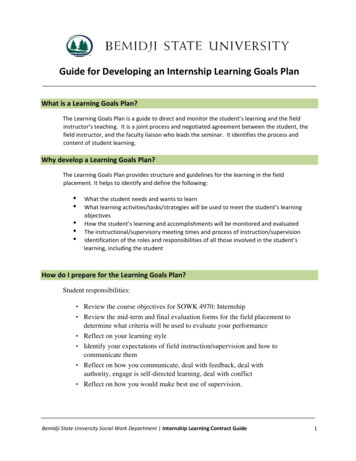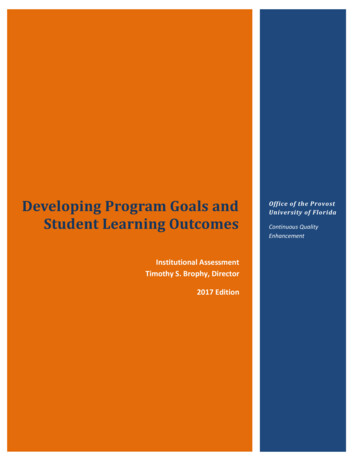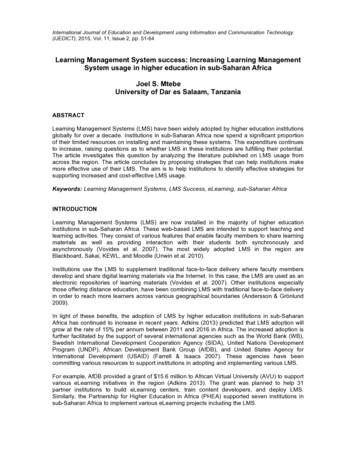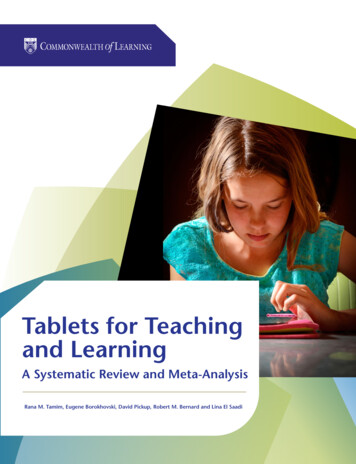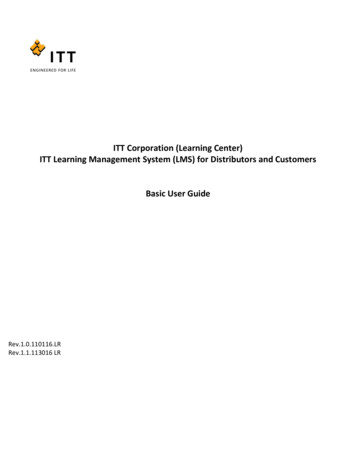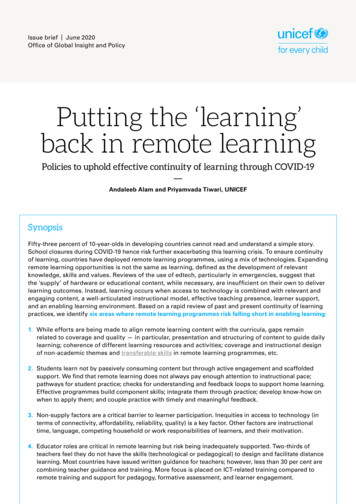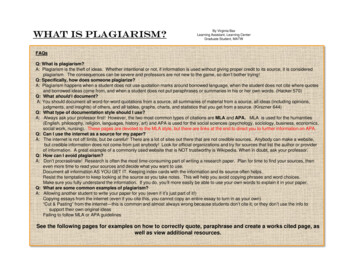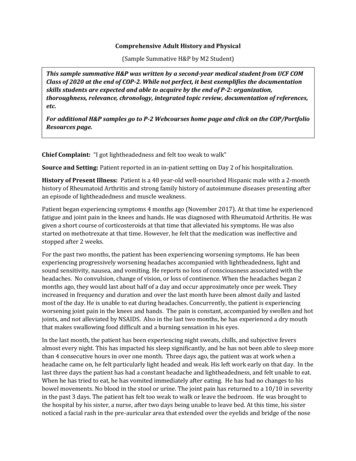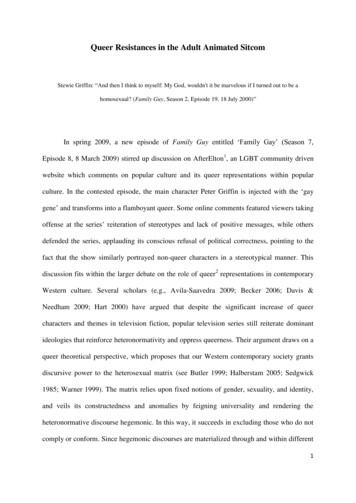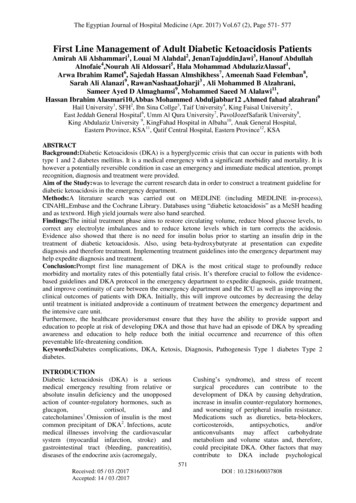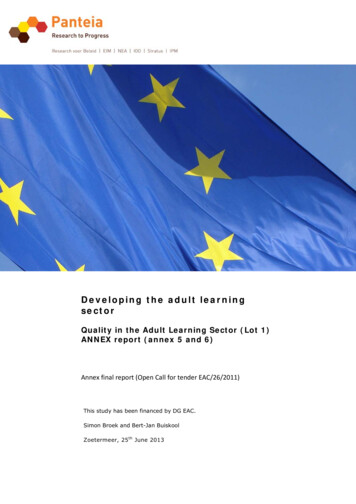
Transcription
Developing the adult learningsectorQuality in the Adult Learning Sector (Lot 1)ANNEX report (annex 5 and 6)Annex final report (Open Call for tender EAC/26/2011)This study has been financed by DG EAC.Simon Broek and Bert-Jan BuiskoolZoetermeer, 25th June 2013
Projectnumber: BA3895The responsibility for the contents of this report lies with Panteia. Quoting of numbersand/or text as an explanation or support in papers, essays and books is permitted onlywhen the source is clearly mentioned. No part of this publication may be copied and/orpublished in any form or by any means, or stored in a retrieval system, without the priorwritten permission of Panteia. Panteia does not accept responsibility for printing errorsand/or other imperfections.II
ForewordPanteia is pleased to present the final report of the study on quality in adult learning,assigned by the European Commission, DG Education and Culture (Open Call for tenderEAC/26/2011). Already many studies have been conducted and also, many develop‐ments have taken place throughout Europe in recent years related to the issue of qualityin adult learning. However, the results of these studies and developments have not yeteffectively been brought together to provide a common knowledge base, to monitor thequality of the sector and to develop a draft quality reference framework. This is exactlywhat this current study is aiming at, namely improving the available knowledge on"Quality in the Adult Learning Sector". The study is mainly focused on mapping interest‐ing practices throughout Europe and providing ‘ingredients’ for the development of aframework for Quality in Adult Learning.This study has been carried out by Panteia in partnership with Dieter Döhmen, KimFaurschou, Barry Hake, Helen Keogh, Christian Kloyber, Balazs Nemeth, and George Zari‐fis. Overall, the research team’s opinion is that this study has triggered an intensive andstimulating professional debate, and we are confident that the results of the study couldplay an important role in structuring future debates and in the development of policiesfor improving the quality of adult learning. This study would not have been possiblewithout the cooperation of numerous stakeholders in the field of adult learning. There‐fore, the research team would like to thank all the respondents around Europe for theirwillingness to cooperate in this study.This volume contains the annex 5 and 6 of the analytical report, including the case studyreports and the country factsheets.Simon Broek and Bert‐Jan Buiskool3
ContentsAbbreviations9Annex 5 (Part A): Case study reports121Austria: Ö‐CERT (at‐cert)132Switzerland: eduQua233Czech Republic: Continuing Education Concept project354Germany: “Hamburger model”425Denmark: Quality Assurance within guidance and counselling526Greece: Quality Always Everywhere (Ποιότητα Πάντα Παντού)637France: Label GretaPlus718Ireland: FETAC Quality Assurance System769Italy: Upter Quality Charter for education services8710 Malta: QA Structures in basic skills9411 Netherlands: Quality Code EVC / APL10512 Norway: Model for teacher training – continuing education11913 Sweden: A general system for support on the quality work12514 Slovenia: Offering Quality Education to Adults13515 United Kingdom (Wales): Inspection of Adult Community Learning (ACL)147Annex 6 (Part B): Country factsheets1591Austria160A) Quality assurance systems: an overview160B) Further elaboration on quality assurance in the country161Belgium167A) Quality assurance systems: an overview167B) Further elaboration on quality assurance in the country16824
3456789Bulgaria178A) Quality assurance systems: an overview178B) Further elaboration on quality assurance in the country178Cyprus185A) Quality assurance systems: an overview185B) Further elaboration on quality assurance in the country186Czech Republic191A) Quality assurance systems: an overview191B) Further elaboration on quality assurance in the country191Denmark197A) Quality assurance systems: an overview197B) Further elaboration on quality assurance in the country197Estonia205A) Quality assurance systems: an overview205B) Further elaboration on quality assurance in the country205Finland211A) Quality assurance systems: an overview211B) Further elaboration on quality assurance in the country213France223A) Quality assurance systems: an overview223B) Further elaboration on quality assurance in the country22510 Germany231A) Quality assurance systems: an overview231B) Further elaboration on quality assurance in the country23111 Greece237A) Quality assurance systems: an overview237B) Further elaboration on quality assurance in the country23812 Hungary245A) Quality assurance systems: an overview245B) Further elaboration on quality assurance in the country2465
13 IrelandA) Quality assurance systems: an overview251B) Further elaboration on quality assurance in the country25214 Italy255A) Quality assurance systems: an overview255B) Further elaboration on quality assurance in the country25615 Latvia262A) Quality assurance systems: an overview262B) Further elaboration on quality assurance in the country26316 Lithuania273A) Quality assurance systems: an overview273B) Further elaboration on quality assurance in the country27417 Luxembourg280A) Quality assurance systems: an overview280B) Further elaboration on quality assurance in the country28018 Malta285A) Quality assurance systems: an overview285B) Further elaboration on quality assurance in the country28619 Netherlands293A) Quality assurance systems: an overview293B) Further elaboration on quality assurance in the country29420 Poland299A) Quality assurance systems: an overview299B) Further elaboration on quality assurance in the country30021 Portugal305A) Quality assurance systems: an overview305B) Further elaboration on quality assurance in the country30522 Romania6251311A) Quality assurance systems: an overview311B) Further elaboration on quality assurance in the country312
23 Slovakia317A) Quality assurance systems: an overview317B) Further elaboration on quality assurance in the country31724 Slovenia323A) Quality assurance systems: an overview323B) Further elaboration on quality assurance in the country32325 Spain331A) Quality assurance systems: an overview331B) Further elaboration on quality assurance in the country33126 Sweden337A) Quality assurance systems: an overview337B) Further elaboration on quality assurance in the country33727 United Kingdom347A) Quality assurance systems: an overview347B) Further elaboration on quality assurance in the country34828 Iceland361A) Quality assurance systems: an overview361B) Further elaboration on quality assurance in the country36129 Norway367A) Quality assurance systems: an overview367B) Further elaboration on quality assurance in the country36830 Turkey373A) Quality assurance systems: an overview373B) Further elaboration on quality assurance in the country37331 Switzerland379A) Quality assurance systems: an overview379B) Further elaboration on quality assurance in the country37932 Croatia383A) Quality assurance systems: an overview383B) Further elaboration on quality assurance in the country3837
8
AbbreviationsCountry aCZCzech maniaEUEuropean HR (Croatia)CroatiaTKTurkeyHUHungaryUKUnited KingdomIEIrelandAbbreviationsACEAdult and continuing educational centres in DenmarkACLAdult and community learningAdAAusbildung der Ausbildner/innenAESAdult Education SurveyAFNORAssociation française de normalisationAIFAssociazione Italiana FormatoriALAdult learningAMUlabour market training in DenmarkAPLAccreditation of prior learningBRUKBedömning, Reflektion, Utveckling, Kvalitet (Assessment, Reflection, Development,Quality) (Sweden)CASCommon Awards SystemCEFRCommon European Framework of Reference for LanguagesCETContinuing Education and TrainingCIFnew Common Inspection FrameworkCPDContinuous Professional DevelopmentCPDContinuing professional developmentCQAFCommon Quality Assurance Framework9
CQAFCommon Quality Assurance FrameworkCTPPermanent Territorial CentersCVETContinuous VETDESDirectorate for Educational Services in MaltaDfESDepartment for Education and Skills (UK)DLLLDirectorate for Lifelong Learning in MaltaDQSEDirectorate for Quality and Standards in Education in MaltaECTSEuropean Credit Transfer SystemECVETEuropean Credit for VETEFQMEuropean Foundation for Quality ManagementENQAthe European Association for Quality Assurance in Higher EducationEOPPNational Organisation for the Accreditation of Qualifications in GreeceEQAVETEuropean Quality Assurance Reference Framework for VETEQFEuropean Qualifications FrameworkESFEuropean Social FundESGEuropean Standards and GuidelinesESIBEuropean Students' UnionESOLEnglish for Speakers of Other LanguagesET 2020Education and training 2020EUAAssociation of European institutions of higher educationEURASHEEuropean Association of Institutions in Higher EducationFECFurther education collegeFETACFurther Education and Training Awards CouncilHETACHigher Education and Training Awards CouncilHEIHigher Education InstitutionHQAAAHellenic Quality Assurance and Accreditation AgencyHRHuman ResourceHRDAHuman Resource Development Authority of CyprusISOInternational Organization for StandardizationIUQBIrish Universities Quality BoardIVETInitial VETLLCLifelong Learning CentreLLLLifelong learningLLPlifelong learning programmeLOLearning OutcomesLQWLernerorientierte Qualitätstestierung in der WeiterbildungMEYSMinistry of Education, Youth, and Sports CZMNEMinistry of National Education Lifelong Learning and Religious Affairs in GreeceMQCMalta Qualifications CouncilMQFMalta Qualifications Framework10
MSMember StateNCHENational Commission for Higher Education in MaltaNFQNational Framework of QualificationsNQAINational Qualifications Authority of IrelandNQFNational Qualifications FrameworkNRTOPlatform of Accredited Private Educational Institutions in the NetherlandsNVALNon vocational adult learningOMCOpen Method of CoordinationOQEAOffering Quality Education to AdultsPIAACProgramme for the International Assessment of Adult CompetenciesPISAProgramme for International Student AssessmentPRPersonal RelationsQAQuality AssuranceQALLLQuality Assurance in Lifelong LearningQEFQuality Effectiveness FrameworkQMSQuality Management SystemQQIQuality and Qualifications IrelandRPLRecognition of Prior LearningSARSelf‐assessment reportSERVSociaal‐Economische Raad van VlaanderenSVEBSwiss Federation for Adult LearningUPTERUniversità Popolare della Terza Età di RomaVETVocational Education and TrainingVEUContinuing adult education in DenmarkVTSVocational Training StructuresWBAWeiterbildungsakademie; the Academy of Continuing Education11
Annex 5 (Part A): Case study reports12
1Austria: Ö‐CERT (at‐cert)Name expert: Christian KloyberIntroduction: Description of the quality measure: introduction and short summaryÖ‐CERT (at‐cert) is an overall framework of quality (“umbrella label”) for adult educa‐tion providers developed and recognized national wide in Austria. It was developed andis implemented (Austrian Federal Ministry of Education and the 9 provinces/ Länder) incooperation with the most important stakeholders of adult education institutions (e.g.the Conference of Adult Education Organisations).The implementation proceeds at macro‐level (national and regional policy) and the mainobjective is to assure and to develop quality of provision of adult learning in Austria. Ö‐CERT is an instrument for transparency of the use of QMS (quality management sys‐tems) and serves at the same time as a quality standard for granting funds and awards;not to forget that Ö‐CERT constitutes an instrument of professionalization.The aim of Ö‐CERT is transparency for customers/learners and for public authorities:At first glance the customers and public authority see, who’s a quality provider. Simpli‐fied administration (one certificate will be enough. It’s not necessary anymore to passand pay for the admission to nine Austrian provinces Quality Assurance Procedures. Ö‐Cert (AT‐Cert) is accepted all over Austria. Concordance with other measures of staffdevelopment and program quality an overall strategy was designed, and Ö‐CERT sup‐ports these initiatives: WBA, Weiterbildungsakademie (quality of staff) and programquality (basic skills/ literacy/ access to complete secondary level for early school‐leavers, adults and migrants not having completed obligatory education) with the Initia‐tive Adult Education of the Federal Ministry of Education and the 9 Länder as well asGrundtvig (National Agency Austria).Part 1: Problem definitionSince the 1990s the issue of quality, the quality of adult education, has found a widerange of discussion and reflection. This process was more target oriented in the field ofvocational education and training, even more oriented to procedures of the organiza‐tion of the teaching (in schools) and finally directed with scepticism by experts andstakeholders of non‐vocational (general) adult education.Adult education in Austria is characterized by a low level of legal framework, little pro‐fessional regulations but of a great diversity of stakeholders and stakes. No wonder thatthe concept of quality originated different interpretations and connotations in thebinning of the discussion and the process of negotiation between all stakeholders ofadult education, from the individual expert to the big organizations dominating themarket of continuing education. A common denominator could easily be found in theimportance of (institutional) autonomy and the economic value of the market. The easi‐est way to tackle the challenge establishing a framework of quality was to look for theeasiest way and the cheapest solution. To ignore the importance of quality was notlonger possible, in the early years of the 1990s it was visible, that market orientation13
meant to participate in the competition. Finally, the concept of quality had and has animportant, indeed an outstanding relevance for institutions and all providers of adultlearning.Quality (in the meaning of controlling), quality in the dimension of assurance and qualityas an impulse for development and innovation was for al long period not really recog‐nized by the Ministry of Education (sector adult education); it seemed that the conceptof quality was in the dominion (domain) of the Ministry of Economy.Another problem arouse discussing the importance of quality in the field of education,especially of adult education. Is it possible to determine “quality” for each subject (theindividual learner, teacher, adult educator) the same way? The learning is directly notvisible in the very moment of the process of teaching and learning, and each individualacts differently in time and social space. The learning outcome is sometimes or very of‐ten not directly related to the learning process, and even more distant from curriculum,program and the setting of the learning. The question arose, how is quality be seen fromthe side of the learners (the demand, need and interest), and how compatible are theseconcepts (and visions) with the market of quality concepts from the provider (the widerange from “marketing” to “public relations”).Learning and controlling (the fear to fail examinations) constitutes a dilemma of dichot‐omy – another question entered the scenario: is “quality” a “wolf in sheep’s clothing”(quality control, controlling)? Is it a new and hidden way to control and to examine?Quickly the promoters and the participants of the discussion learnt the lesson: to dealwith concepts of quality in adult educations means to assure transparency.The last 15 years – and as a result of the discussion and the characteristics of the sector(adult education in Austria) – more and more organizations and institutions decided toadopt a quality management system. The most common are: EN ISO 9001, EduQua (inthe early beginning of the Swiss Quality Label experts of eduQua and the Swiss AdultEducation presented this concept in various seminars and workshops too in Austria),EFQM and LQW (a clever and commercially successfully adaption of a mix of tools fromresponsive evaluation, organisational development and quality management, “Learner‐Oriented Quality Certification for Further Education Organizations by Art‐Set Trademarkand with the support of the ESF, European Social Fund).A parallel development starting in the late 1990s created several Quality Labels in thedomain of the Länder (4 of the 9 Austrian provinces). After 1998 the Austrian states(Länder) Upper Austria (Oberösterreich, Quality Label EBQ), Lower Austria (Nied‐erösterreich, Quality Label CERT‐NÖ), Salzburg (Quality Label S‐QS) and Vienna (Wien,Quality Label, wien‐cert) created their own system of quality assurance. To be acceptedfor individual funding (concept of an individual learning account “Bildungskonto”) theproviders of adult education have to apply for the regional quality label. Consequentlysome of the Länder created its own quality control or adopted one existing. Leading in2010 to theoretical situation, that it would have been necessary that a possible provider(institution) of adult learning should apply for 9 different Quality Labels and pay for it 9fees valid for approx. 3 years.14
Finally, the Federal Ministry of Education in coordination with all 9 Austrian provinces(the 9 regional governments) agreed in creating an “umbrella label”, including and giv‐ing validity to different and existing quality management labels and systems, the Ö‐CERTsystem.Part 2: ApproachThe development of Ö‐Cert as the Austrian quality‐“umbrella label” was initiated withthe expertise of researchers (Schlögl/Gruber 2003; Gruber/Schlögl et al. 2007; Gru‐ber/Schlögl 2007). Project experiences and results of evaluations considering the situa‐tion of professionalization and quality management as well the situation of the publicfunding made it clear that a common and Austrian wide model of quality (assurance anddevelopment) had to be established. Transparency of the model and a high acceptanceare of central importance. The project of creating an acceptable quality label started in2008, finally all important stakeholders shared the same commitment: the representa‐tives of all nine Austrian provinces (Länder), experts and researchers as well as the Aus‐trian Ministry of Education (BMUKK) and representatives of the Austrian conference ofAdult Education Institutions. The Federal Ministry of Education assumed the responsibil‐ity for the project and the financing of the team of researchers, practitioners, andstakeholders of adult education. The leading team was the head of the Austrian Institutefor Research on Vocational Training ( öibf), Peter Schlögl and the head oft he departmentof Adult Education of the University of Klagenfurt, Elke Gruber. In seven meetings of allrelevant Austrian stakeholders of adult education institutions followed by 2 expert’sworkshops from October 2008 until May 2009 the concept was elaborated and pre‐sented for discussion and an Austrian wide consultation process during the summer of2009 until autumn 2010; finally in the accepted concept was presented in October of2010.Initial situationIn Austria adult education is driven mainly by collective provision’. That means throughinstitutions run by various interest groups (employer and labour associations, churches,political parties, etc.), and traditional providers reaping a large part of the market share.These are generally ‘non‐profit’ organisations. Mixed financing structures vary from in‐stitution to institution. More recently, a large number of new private sector financedproviders have also emerged. These are generally very small establishments (often oneperson enterprises). At first glance, a large proportion of the students would seem to beindividual ‘customers’ who access adult learning through market channels (like coursecatalogues, etc.) and pay for their courses. On more close inspection, however, there aresome complex support mechanisms that complicate this assessment. (Lassnig, 2011)That leads to a central problem to be resolved by the research team developing the Ö‐CERT model: the definition of adult education in Austria, or in other word, who is a pro‐vider of adult education and who is not. Depending on the definition used (from the ex‐tensive to the more intensive one) in 2007 about 1.800 to 3.000 providers (institutionsand organizations) were identified (Gruber/ Brünner/ Huss 2009). The results of a previ‐ous research project (PERLS) could be used to work on the concept and definition of“adult education in Austria”, followed by an Austrian wide discussion of the use of con‐15
cepts as “education”, “life long learning”, “adult learning (formal, non‐formal, infor‐mal)”, “continuing education (further education)”, “non‐vocational”/ “vocational‐education”, “self‐directed learning” A next step identified the diverse situation of the use of quality management systems,accreditation and certifications concepts in use, evaluations and self‐evaluations, qualityseals e.g.As mentioned before the Austrian provinces (Länder) created their own system of qual‐ity assurance and development. It was obvious for everybody involved in the processthat this situation was no more tolerable. The decision to create the umbrella label Ö‐CERT was taken. And the situation given that the main responsibility of the quality con‐cept lays in the hands of each institution of adult education respecting their autonomyas a high value, made it clearer, how the umbrella label“ could work: the mechanism ofexternal quality assurance consists mainly to check and to document how each memberof the community of institutions (providers) of adult education perform their qualitymanagement process transparently and reliable. Ö‐CERT has to be a quality frameworkand not a new standardised Austrian wide quality management system (as for examplethe Swiss EduQua system). The Ö‐CERT mechanism of quality assurance had to respectthe heterogeneous situation, the diversity of quality systems in use and the differenceshow quality was and is interpreted in the field of Austrian adult education. This wouldrise the awareness of responsibility of each stakeholder: the provider of adult learning,the public and non‐public funding of adult education as well as the individual adult per‐son looking for an acceptable offer depending on lifelong guidance or needs and interestassessment.Core elements of the quality framework Ö‐CERTAccepted as a transparent tool based on comprehensible criteria for funding (publicand non‐public funding), for the target groups (learners) and all organizations of adulteducation who recognize measures of quality all over AustriaSafeguard the principle of autonomy of the institutions of adult education in Austria;quality measures should support the organizationPrinciple of efficient and simple administration of quality (quality management)Transparent and open (accessible) list of all quality providers constitutes a acceptablebasis for funding and support as well as awardingInternational (European) acceptance (EQARF as reference)Open for innovation an new models of quality development (adult learning, lifelonglearning e.g.) and flexible for adaptationsÖ‐CERT is not a new management system of quality management (QMS) but a systemof recognition and certification of quality in adult education (without own audits).Ö‐CERT has no intention to intervene or adapt existing QMSÖ‐CERT will not support any protective measures (protection on the institutions anorganizations involved historically and politically in Austrians educational system)Ö‐CERT supports other instruments of quality development (e.g. AMS, job centres)Proposed structure of the quality frame Ö‐CERT16
1Identification as a provider of adult education:The provider has to fulfil basic requirements. The criteria is to be accepted as a pro‐vider of adult education (definition of adult education):General basic requirementsBasic requirements concerning the organization of the providerBasic requirements concerning the offers of the providerBasic requirements concerning principles of ethics and democracyBasic requirements concerning quality assurance2Confirmation of quality certificates:The provider must have one of the valid Quality Management Systems or Quality As‐surance Procedures – according to the Ö‐Cert‐List, which itemize nine accepted QMSand Quality Assurance Procedures. The most important selection criterion is the ex‐istence of external audits.3Control (checklist) of applications by the Ö‐CERT agency and by the accreditationgroup of experts.4Registration as one of the Quality Providers of Adult Education in Austria and receiptof Ö‐Cert (actual fee: 100,00 EUR)Basic principles of Ö‐CERTBasic principles and paradigm of the concept “adult education” (definition)Life stage orientation to foster political participation (citizenship), social participa‐tion, professional orientation, related to ones own biography; education is more thanthe application of tools and skill orientation, adult education means more than“qualification” or “training”.Lifelong learning embraces all formats for learning (formal, non‐formal, informal), thediverse places where learning takes place, and all ages. Learning comprehends all tar‐get oriented activities to improve knowledge and knowing, skills and competences,insights e.g.Adult education (adult learning and continuing education are here used as synonyms)is defined as all formats and forms of learning of the adult population in the contextof profession and vocation, non‐vocational and general education, citizenship educa‐tion and community education, culture and the arts, privately, in public institutions orin economic context; conducted by teachers or self‐directed. Adult education activi‐ties follow a political strategy and social responsibility and are structured by organi‐zations on a legal and financial fundament.Providers of adult education are all organisations, associations, enterprises, institu‐tions, coordinated networks and cooperation offering adult learning (as describedabove).Basic principles of organisationThe organisation applying Ö‐CERT must provide minimum one offer of adult learningin Austria (regularly, planned, systematically developed and realized, publicly com‐municated and transparent).Adult education is a core task.The institution applying must present an experience of minimum 3 years in the Aus‐tria market of adult education17
The director of the organization or minimum one person of the academic or peda‐gogical (andragogical) staff must present a profound professional knowledge and ex‐perience (minimum 2 years).The agenda of the organisation must be accessible by the public (principle of trans‐parency of rules and procedures).Ethical and democratic principlesThe organisation accepts the Universal Declaration of Human RightsThe organisation is convicted to democracyBasic prerequisites of the offer (provision of adult education)The offer (program) is in principle open for all target groups of adult learning and/ortarget oriented groupsRecognition of prior learning activities (formal and non‐formal education as well asinformal learning)Training for product specific placement (product training) or to canvass members areexplicitly excluded to apply for the Ö‐CERT labelSport and leisure offers are excludedReligious activities (statements of faith) are not taken into consideration[ ]Seven core elements of qualityMission statement of the organization/ guiding principles(description of criteria of the guiding principles and goals of the provider)Offer (program) of the organisation (provider)(description of the target groups, needs and interests, general information and dataof the target groups and educational sector, information management, diversity andgender issuesManagement of the provider organisation (quality profile)Quality of staff (quality profile)Management of quality development and culture of feedback (error management),definition of qualityQuality of the infrastructure (resources), best conditions for the learner (clients)Quality of public relations and feedback culture (outreach work)Part 3: Contextual factors that influence the quality measureThe model of Ö‐CERT was developed comparing with all existing QMS systems (school,higher education, vocational education and training), systems applied in Austria (federalrepublic and Länder) as well as those in Europe (especially in Germany: Deutsches Insti‐tut für Erwachsenenbildung and Switzerland: SVEB); the Austrian quality agencies (AQA,QUALITY AUSTRIA) were consulted concerning QMS with external audits. A previousstudy on quality (INSI‐QUEB) conducted by Gruber/ Schlögl (2007) was re‐evaluated.Factors of success of QMS accepted by Ö‐CERTLegal framework of QMS and independent external audit18
The independent external audit includes also an audit on‐siteUsability all over the adult education sector (VET and NON‐VET)Validity oft he certification (time frame maximum 4 years)Clear and transparent procedure of controlling and extensionConcept of quality and data protection (of persons and participants: data privacy)QMS includes dimensions of development (not only controlling or assurance): devel‐opment oft the organisation and staff1Factors of limitationThe different systems of quality management used by Austrian providers of adult learn‐ing, the complex and heterogeneous field of stakeholders, the lack of a clear legislationof adult education in Austria, the influences of diverse political actors and structures(national, regional, social partners, influences of political parties e.g.), a low profile ofthe profession (adult educators) in comparison with the sc
Developing the adult learning sector Quality in the Adult Learning Sector (Lot 1) ANNEX report (annex 5 and 6) Annex final report (Open Call for tender EAC/26/2011) This study has been financed by DG EAC. Sim
